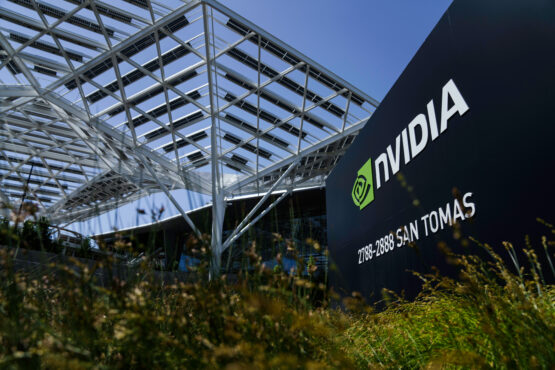AI will require trillions of dollars of investment and massive new power generation. Which is why SA will barely feature in this race. From Moneyweb.

The chart below shows Nvidia quarterly revenues exploding to around $25 billion, a more than five-fold increase since the start of 2024.
Other tech companies like Google and Microsoft are eyeing these numbers with mouths agape. Analysts who think Nvidia may have peaked might want to rethink their forecasts.

“Mainstream pundits are stuck on the willful blindness of ‘it’s just predicting the next word’. They see only hype and business-as-usual; at most they entertain another internet-scale technological change,” writes Leopold Aschenbrenner in a series of essays entitled The Decade Ahead.
Before long they will wake up. What is about to be unleashed upon the world is both exhilarating and potentially terrifying.
Artificial ‘superintelligence’
AI is moving to AGI (Artificial General Intelligence) much faster than was originally envisaged, allowing machines to surpass human cognitive intelligence. Beyond that lies ASI, or artificial superintelligence.
Nvidia isn’t the only player in the AI chip space. Google has its Tensor Processing Units that accelerate machine learning workloads.
Nvidia controls more than 70% of the market for AI chips, with rivals Intel and Advanced Micro Devices eager to chisel away at this gigantic market.
There’s no doubt that Nvidia has a huge head start – what some are calling a moat – but its mouthwatering gross margin of 78% is begging for aggressive competition, and it looks like that is on its way.
The AI chip market is expected to reach $400 billion in annual sales before the end of the decade and see plenty of new entrants offering bespoke chips suited to particular tasks.
Read/listen:
WEF forecasts rapid growth in AI, big data and cybersecurity jobs
Nvidia and its friends boost SA unit trusts
Magic and Warhammer: The power of wide-moat IP
AI is declining in cost faster than any disruptive technology preceding it.
“The cost to operate artificial intelligence models of equivalent performance has been halving every four months – a trend that we expect to persist throughout this decade. In contrast, Moore’s Law in the semiconductor space cut costs in half every 18-24 months, suggesting that the AI revolution is moving 4-6 times faster,” says ARK Invest.
Microsoft and OpenAI are rumoured to be working on a $100 billion data centre anchored by an AI supercomputer called Stargate, slated to launch in 2028.
There’s huge investment pouring into similar projects in the US, China, Dubai and elsewhere. Microsoft and Google will likely do $50 billion-plus each in capex in 2024, with Meta not far behind. Not all of this is for AI, but it’s clear where the trend is going.

Companies will make large AI investments if they expect the economic returns to justify it, says Leopold Aschenbrenner.
OpenAI doubled its revenue to $2 billion revenue over the six months to February 2024. If that rate of doubling continues every six months, it should hit $10 billion by early 2025.
Microsoft is already estimated to be generating $5 billion in incremental AI revenue.
What this suggests is that the massive investment in AI promises a quick return. When companies like Microsoft, Google and Meta start to earn a substantial portion of their revenues from AI – likely just a few years away – the AI monster will demand even greater dobs of capital.
If Microsoft can convince a decent percentage of its 350 million paid subscribers to pay another $100 a month for an AI add-on, the revenue figures go parabolic.
“It’s hard to understate the ensuing reverberations. This would make AI products the biggest revenue driver for America’s largest corporations, and by far their biggest area of growth. Forecasts of overall revenue growth for these companies would skyrocket,” says Aschenbrenner.
“Stock markets would follow; we might see our first $10 trillion company soon thereafter. Big tech at this point would be willing to go all out, each investing many hundreds of billions [at least] into further AI scale out. We probably see our first many-hundred-billion-dollar corporate bond sale then.”
The power constraint
The biggest single constraint in this AI race is power. US power generation has increased just 5% in the last decade, but the possibility of a 100-gigawatt AI cluster, as is being discussed, will swallow about 20% of all US electricity on its own.
To feed the AI beast, tech companies may soon find themselves in the power generation business or possibly buying aluminium smelters for their huge power contracts.
Clean energy would be preferable, but a Trump administration is more likely to demand US domination of the AI race lest China or a Middle eastern country overtake it. That would mean tapping abundant natural gas reserves and tamping down green energy targets.
The dangers of falling behind in AI, at the state level, are enormous.
Superintelligence can – and will – become weaponised. Rogue states could use it to threaten annihilation or to sabotage competing nation states, even taking out any nuclear deterrents. Those with just a few months’ lead in AGI will have a huge competitive advantage.
Aschenbrenner argues that the US must win this race, lest AGI supremacy is forfeited to dictatorships.
“The clusters can be built in the US, and we have to get our act together to make sure it happens in the US. American national security must come first, before the allure of free-flowing Middle Eastern cash, arcane regulation, or even, yes, admirable climate commitments.”
South Africa is nowhere in this race. The huge power needs of this emerging industry will not be satisfied in a country that has struggled to keep lights on for most of the last decade, barring the past year of course.
